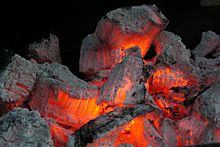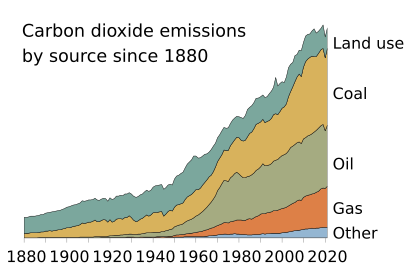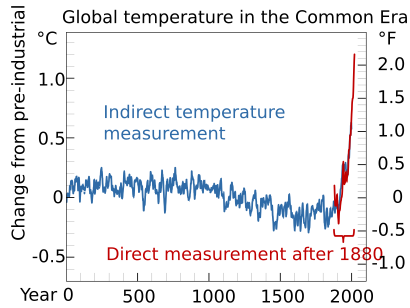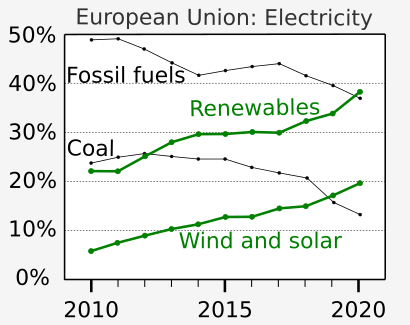Fossil fuel facts for kids
Fossil fuels are fuels that come from old life forms that decomposed over a long period of time. The three most important fossil fuels are coal, petroleum, and natural gas.
Oil and gas are hydrocarbons (molecules that have only hydrogen and carbon in them). Coal is mostly carbon. These fuels are called fossil fuels because they are dug up from underground. Coal mining digs up solid fuel; gas and oil wells bring up liquid fuel. Fossil fuel was not much used until the Middle Ages. Coal became the main kind of fuel with the Industrial Revolution.
Contents
Uses
Most of the fuels people burn are fossil fuels. A big use is to make electricity. In power plants fossil fuels, usually coal, are burned to heat water into steam, which pushes a fan-like object called a turbine. When the turbine spins around, magnets inside the turbine make electricity.
Crude oil can be separated to make various fuels such as LPG, gasoline, kerosene, jet fuel, and diesel fuel. These substances are made by fractional distillation in an oil refinery. They are the main fuels in transportation. That means that they are burned in order to move cars, trucks, ships, airplanes, trains and even spacecraft. Without them, there wouldn't be much transport.
People also burn fossil fuels to heat their homes. They use coal less for this than they did long ago, because it makes things dirty. In many homes, people burn natural gas in a stove for cooking.
Fossil fuels are widely used in construction.
Origin
All fossil fuels come from the periods in Earth's history when the Earth had huge tropical forests. In those periods, plants lived, grew and died, faster than they decayed. In other words, they were times when much of the dead vegetation did not entirely decompose. Instead it became coal and related substances such as peat.
The times of the great wetlands which produced coal and peat were in the Upper Carboniferous (Pennsylvanian), continuing in the first part of the Permian; the Jurassic and Eocene periods. Virtually all the worlds' coal dates to those periods.
Problems
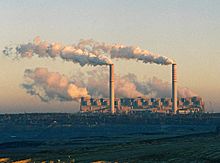
Most air pollution comes from burning fossil fuels. This can be reduced by making the combustion process more efficient, and by using various techniques to reduce the escape of harmful gases. This pollution is responsible for causing the earth to get warmer, called global warming. They are also non-renewable resources, there is only a limited amount of coal, gas, and oil, and it is not possible to make more. Eventually all the fossil fuels will be used. Some scientists think that coal will have run out by 2200 and oil by 2040.
Renewable energy sources like biomass energy such as firewood are being used. Countries are also increasing the use of wind power, tidal energy, and solar energy to generate electricity. Some governments are helping automobile makers to develop electric cars and hybrid cars that will use less oil.
Environmental effects
The burning of fossil fuels has a number of harmful environmental impacts. All fossil fuels release CO
2 when they burn, thus accelerating climate change. Burning coal contributes to atmospheric particulate matter, smog and acid rain.
When fossil fuels are burned, greenhouse gases such as CO
2 are released into the atmosphere. This causes climate change. In most parts of the world climate change is negatively impacting ecosystems. Some spieces become extinct, people produce less food. This adds to the problem of world hunger. The World Health Organization have stated that climate change is the greatest threat to human health in the 21st century.
When burning, fossil fuels also generate sulfuric and nitric acids, which fall to Earth as acid rain. Monuments and sculptures made from marble and limestone are particularly vulnerable, as the acids dissolve calcium carbonate.
Fossil fuels also contain radioactive materials, mainly uranium and thorium, which are released into the atmosphere. In 2000, about 12,000 tonnes of thorium and 5,000 tonnes of uranium were released worldwide from burning coal. It is estimated that during 1982, US coal burning released 155 times as much radioactivity into the atmosphere as the Three Mile Island accident.
The harvesting, processing, and distribution of fossil fuels also have environmental effects. Coal mining methods, particularly mountaintop removal and strip mining, have negative environmental impacts, and offshore oil drilling is hazadous to aquatic organisms. Coal is sometimes transported by diesel-powered locomotives, while crude oil is typically transported by tanker ships, requiring the burning of additional fossil fuels.
Illness and deaths
Environmental pollution from fossil fuels impacts humans. Air pollution from burning fossil fuel cause illness and death when inhaled. Health effects include premature death, acute respiratory illness, aggravated asthma, chronic bronchitis and decreased lung function. The poor, undernourished, very young and very old, and people with ill health are more at risk. Over 8 million people died in 2018 because of air pollution due to fossil fuels. That was nearly 1 in 5 deaths worldwide.
Fossil fuels cause the highest levels of greenhouse gas emissions and are the most dangerous for human health. In contrast, modern renewable energy sources appear to be safer for human health and cleaner.
Efforts to reduce the use of fossil fuel
Humanity tries to counter the negative effects of fossil fuel. Governments introduce rules against releasing waste products like fly ash in the atmosphere. Also, there is a movement to use alternative energy sources, such as renewable energy. As the data shows, coal, oil, natural gas, and biomass cause higher death rates and higher levels of greenhouse gas emissions than hydropower, nuclear energy, wind, and solar power; 1.8 million lives have been saved by replacing fossil fuel sources with nuclear power.
In December 2020, the UN Secretary General António Guterres declared that "Humanity is waging war on nature. [...] Nature always strikes back – and it is already doing so with growing force and fury."
However, Guterres also said there is still cause for hope, anticipating Joe Biden's plan for the US to join other large emitters like China and the EU in adopting targets to reach net zero emissions by 2050.
Images for kids
-
A petrochemical refinery in Grangemouth, Scotland, UK
-
An oil well in the Gulf of Mexico
See also
 In Spanish: Combustible fósil para niños
In Spanish: Combustible fósil para niños


